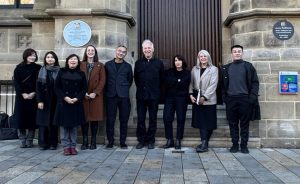Transvaluation
Asia Triennial Manchester
October 25–December 12, 2025
Convenors: Anna Bergqvist, Henk Slager, Hongjohn Lin, Kalen Lee, Miya Yoshida, Sarah James, Yusaku Imamura.
Since 2008, the Asia Triennial Manchester (ATM) has brought together international artists, audiences and institutions to celebrate Asia through different themes, and explore the complexity of the British Asian diaspora. ATM’s objective is to develop new collaborative curatorial models that share and create contemporary visual art, reaching new audiences and communities. The Triennial has a history of building diversity agendas, curatorial development initiatives, and producing new commissions across exhibitions, collaborations, experimental workshops and research projects. Past ATM themes include Protest (2008), Time and Generation (2011), Conflict and Compassion (2016), Who Do You Think You Are (2018), and Love Thy Neighbours (2021).
The starting point of the sixth edition of the Asia Triennial Manchester (ATM6) is an urgent question: How can we reclaim value by withdrawing it from the reductive, quantifying interpretation of the omnipresent neoliberal paradigm, and develop a mode of speculation grounded in other forms of practical experimentation—experiments that, in turn, create space for qualifying new ways of thinking about value and measurement?
To take back value is to revalue value—beyond normativity and standardized measurement. The first task of transvaluation is to uncouple value from quantification in ways that affirm an ecology of qualitatively different capacities. This framing of transvaluation draws from both post-Marxist critique and ecological thinking, recognizing that value has long been constructed by dominant power structures and often defined in anthropocentric terms. The current condition of the Anthropocene further complicates how value is attributed and distributed across human and non-human divisions. This demands a head-on engagement with what we know as economy—the management of the household. Value, and credit alike, is, too valuable to be left to those who own power.
This critique—that the calculative rhetoric of capitalism produces an impoverished version of surplus value—can be directly linked to the historical context of Manchester. After all, it was in the Chetham Library that Marx and Engels collaborated in the 1840s on the ideas that would later form the basis of The Communist Manifesto. Engels’ The Condition of the Working Class in Englandvividly depicted the industrial precarity and social inequality embedded in the urban fabric of Manchester. In this sense, Manchester becomes more than a host city for ATM—it emerges as a symbolic primary scene for the revaluation of value per se.
Curatorial Assembly and Convenors
This edition of the Triennial is being developed by a group of convenors forming the Curatorial Assembly. The term “convenor” is deliberately chosen over “curator” to underscore a shared, democratic model of authorship and responsibility. This shift signals a political commitment within curatorial culture. Since spring 2024, the convenors have met regularly—both online and in person—to collectively reflect on the curatorial proposition outlined above. These gatherings, supported by shared digital documents, have fostered an evolving curatorial framework shaped through ongoing dialogue and collaboration.
The first Curatorial Assembly, held on November 28, 2024, in Manchester, culminated in the presentation of preliminary ideas and conceptual contours for the ATM6. Following the assembly, the presenters—partly in response to feedback—were invited to further develop their proposals for a special issue of Curatography. This issue presents a series of articulated concepts that collectively outline the curatorial narrative and program for the upcoming exhibitonary events.
The 6th Asia Triennial Manchester emerges in response to this very challenge. Through ongoing exchange, the convenors not only shape a discursive framework aimed at recalibrating and reimagining value, but also engage in conversations around artistic contributions that offer idiosyncratic perspectives grounded in research-based practice. The approach adopted is one of transvaluation—a process that is affectively and intensively lived, and that participates in the ascription of meaning in the world.


